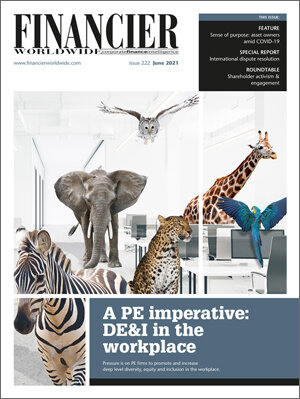Environmental efforts: tackling the ‘greenwashing’ threat
June 2021 | FEATURE | CORPORATE GOVERNANCE
Financier Worldwide Magazine
The process of ‘greenwashing’ – generally defined as an unsubstantiated claim that a product or service is environmentally friendly – is becoming increasingly widespread, as companies face mounting pressure to demonstrate their green credentials.
In a bid to reduce the prevalence of greenwashing in the UK, the Competition and Markets Authority (CMA) is looking to revamp how it currently tackles false claims surrounding eco-friendly products and services via the introduction of fresh legislation.
“Increasing numbers of people are quite rightly concerned about the environment and want to play their part by being greener,” states Andrea Coscelli, chief executive of the CMA. “Our role is to make sure that consumers can trust the claims they see on products for sale and do not fork out extra for items falsely presented as eco-friendly.”
Moreover, trust needs to be attained against an expensive backdrop. According to the CMA, in 2019, UK consumers spent £41bn a year on ethical goods and services – almost four times as much as was being spent on such items two decades ago. In addition, a January 2021 CMA-coordinated global review of randomly selected companies found that 40 percent of green claims could be misleading consumers.
Drilling down, the CMA review found that terms such as ‘eco-friendly’, ‘sustainable’ and ‘natural’ are often used by companies with no substantiating evidence. The regulator also found that many logos and labels that companies display have no affiliation with any accredited organisation. Moreover, in some cases, the CMA discovered that information had been deliberately omitted to make a company appear more environmentally-friendly.
“Greenwashing misguides consumers and often results in a lack of trust towards claims of sustainability,” says Leyla Acaroglu, founder of The UnSchool. “Companies can accidentally greenwash when they think that their product is environmentally preferable. Then there are cases where companies actively misguide their customers and want to gain financial benefit from pretending products or services are greener.
“Greenwashing can also result in deep misunderstandings in the wider community about what is preferable and what is not, as many times basic assumptions are heavily promoted,” she continues. “Products that make claims about material properties, such as biodegradable, recyclable and renewable, are classic issues.”
Legislation
The CMA’s new legislation – which is expected to come into force within the next few months – is described by the regulator as a direct response to companies whose products and services falsely purport to be environmentally-friendly. It is also hoped that the legislation will help support the move toward a low carbon economy.
“As environmental issues become more important to companies’ bottom line, efforts to tackle the risk of greenwashing will continue to climb the corporate agenda, and bring eradication of the practice a little closer.”
Furthermore, the CMA will consider whether failing to provide all relevant information about the sustainability of a product or service, such as whether it is highly polluting or non-recyclable, could mislead consumers and therefore break consumer law. The regulator has also stated that companies found guilty of pursuing sustainability initiatives or making environmental claims can expect increased scrutiny and application of the new legislation.
“It is good that some action is being taken, however it is not nearly enough,” says Dr Acaroglu. “Organisations need clear guidance on what is acceptable and what they should do to ensure that they do not greenwash. All claims made about environmental performance should be backed up by clear and transparent data that ensure that the product is actually performing well from an environmental standpoint, not just in one indicator area such as climate change.”
A particular concern for practitioners is that the CMA’s proposals will focus too heavily on singular impact areas, such as carbon, rather than the full spectrum of environmental impacts. “We have to assess the entire environmental impacts of products and services as they move through the economy,” suggests Dr Acaroglu. “Many organisations do not know what these impacts are, so having verifiable information is critical.”
Eradicating greenwashing
As environmental issues become more important to companies’ bottom line, efforts to tackle the risk of greenwashing will continue to climb the corporate agenda, and bring eradication of the practice a little closer.
“A lot of the mistakes that lead to greenwashing are unintentional, when companies do not invest in the design and research needed to know if their products are performing in an environmentally preferable way,” observes Dr Acaroglu. “We need a full redesign of systems to get to a genuinely sustainable future, and that requires companies investing in R&D and then hiring the right people to design the solutions that create measurably beneficial sustainable and circular products.”
Among the tools Dr Acaroglu considers useful in assessing and designing better performing products and services are sustainable design and lifecycle thinking and circular economy business strategies – actions that work toward long-term solutions, rather than short-term fixes.
“We know that many businesses will be looking for ways to reduce their carbon footprint and we strongly support this, but the claims they make must not mislead consumers in the process,” concludes Mr Coscelli. “It is important that people can easily choose between those companies that are doing the right thing for the environment and those that are not, so that businesses genuinely investing in going green can be properly rewarded by their customers.”
© Financier Worldwide
BY
Fraser Tennant

